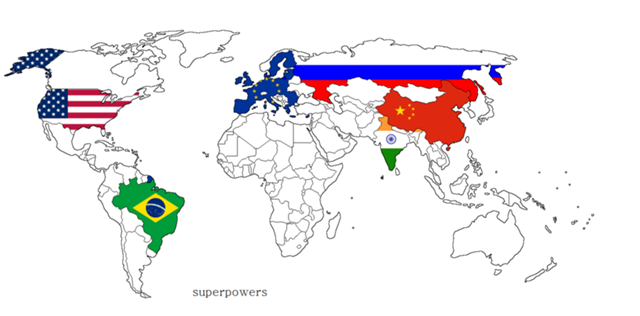Superpower
Superpower called the state with enormous political power, with economic and military superiority over other countries. The geopolitical position of superpowers allows them to influence the state in the most remote parts of the planet. In the modern world superpower needs to have a strategic stockpile of nuclear weapons.
The term "superpower" was coined by William Fox in 1944 in the book "Superpower". After the Second world war, the superpowers were considered three States: the UK, the USA and the USSR. Britain soon began to lose their colonies, and by 1957 had lost its superpower status.
Until 1991, in the world there were two superpowers (USSR and USA), who led the strongest military-political blocs (Warsaw Pact and NATO). After disintegration of the USSR superpower status remained only in the United States. To describe such a situation had been created by the term "hyperpower." But the beginning of the XXI century, the United States continues to be the most powerful nation in the world, however, many experts believe that superpower status can be lost or already lost. Gradually approaching the status of a superpower China.
Among political scientists there is a perception that the era of superpowers is gone. Today's world is becoming multi-polar, with several centers of influence and a growing role and potential of regional superpowers. Potential superpowers now include China, Brazil, European Union, India and Russia.
The great powers
The great powers called the state, which, because of its political influence play a decisive role in the global geopolitical situation. This name is unofficial, it appeared after the Napoleonic wars and put into official circulation by Leopold von Ranke.
In recent history, the status of the great powers had five member countries of the UN security Council. All the great powers participated in most of the world's conflicts and are nuclear powers.
There are three criteria by which a country can assign the status of a great power. Is its resource potential, "the geography of interest (depending on the territory covered by the influence of power and international status.
In the modern world $ 10 the great powers: USA, China, Russia, India, Japan, Germany, France, Brazil and UK.
Regional powers
A regional power is a non-title States that due to its economic and political potential play an important role in the system of international relations in a separate macro-regions. Thus, in world politics they have a great influence, with the exception of those regional powers that are both great powers.
In today's world there are 24 regional state. In Asia, the middle East is Israel, Iran, Saudi Arabia and Israel. In East Asia – China, Japan and South Korea. South Asia – India and Pakistan. In South-East Asia – Indonesia. In America, the U.S. and Canada. In Latin America – Brazil and Mexico. North Africa – Egypt. In West and Central Africa – Nigeria. In South Africa – South Africa. In Western Europe, the United Kingdom, Germany, Spain, Italy and France. In Eastern Europe – Russia. In Oceania – Australia.
